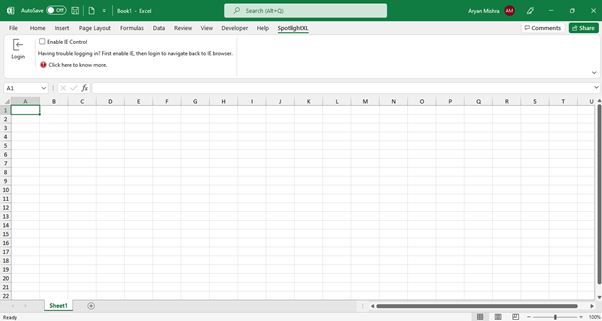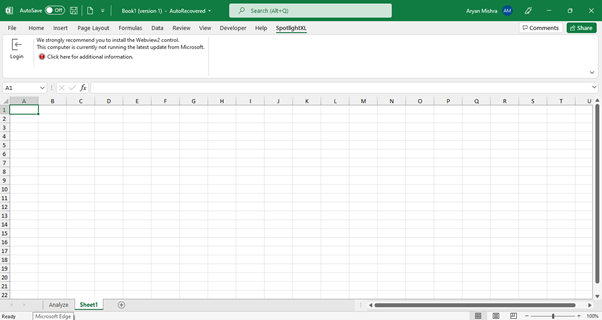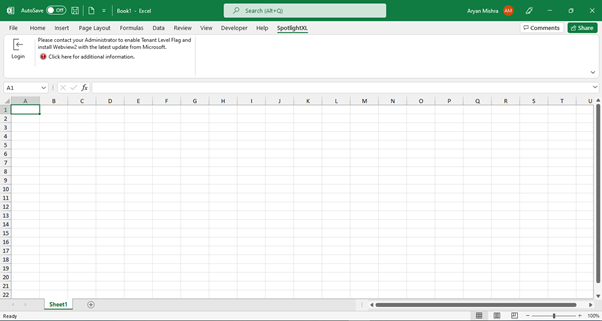- 4 Minutes to read
- Print
- DarkLight
- PDF
SpotlightXL and Spotlight for Office Client Requirements
- 4 Minutes to read
- Print
- DarkLight
- PDF
SpotlightXL and Spotlight for Office require that you have .NET and Microsoft Visual Studio Tools for Office Runtime on your computer.
Microsoft .NET 4.7.2 and TLS 1.2 Requirement Beginning February 1, 2019
Planful supports only TLS 1.2. All customers who are using either Spotlight or Dynamic Planning must do two steps:
- Upgrade to .NET Framework 4.7.2.
- Upgrade to the latest Spotlight Add-in.
By upgrading to Microsoft .NET Framework 4.7.2, you also get TLS 1.2. Transport Layer Security (TLS) protocol is an industry standard designed to protect the privacy of information communicated over the Internet.
End users with ClickOnce, which provides automatic installation of the latest client software, must have Microsoft .NET Framework 4.7.2 installed.
Users who manually install the January 2019 or later client software must have Microsoft .NET Framework 4.7.2 installed.
MS Office Users:
If you are using Spotlight for Office (SpotlightXL, PPT, Word) or just SpotlightXL and you do not have .NET Framework 4.7.2 installed, then you are affected by this change. We recommend to update the .NET Framework to 4.7.2 as early as possible. All users who do not have .NET Framework 4.7.2 installed will not be able to access the Spotlight Add-Ins.
If you do not have .NET Framework 4.7.2, then you will see a message on the menu ribbon:
.NET Framework needs to be upgraded. We recommend to do it at the earliest.

Browser Users:
If you use any of the modern browsers to log in to Planful (Firefox, Chrome, Safari, IE 10 and above), you will NOT be affected by this change. All the modern browsers already support TLS 1.2. If you are using lower versions of IE and use TLS 1.0 or TLS 1.1, please upgrade to TLS 1.2 by upgrading your .NET Framework.
Upgrading to .NET Framework 4.7.2:
If you see the message that .NET Framework needs to be upgraded, then you need to upgrade the .NET Framework to 4.7.2. To upgrade the .NET Framework to 4.7.2, you need to have Admin rights on your PC, otherwise you can ask your IT team to upgrade it.
If .NET Framework 4.7.2 is already installed, then you do not need to do anything and there will not be any impact for you to access the application.
Where to Download .NET Framework 4.7.2:
https://www.microsoft.com/net/download/dotnet-framework-runtime
How to Determine Which .NET Framework is Installed:
For Additional Information, Refer to the Links Below:
https://en.wikipedia.org/wiki/Transport_Layer_Security
https://docs.microsoft.com/en-us/windows/desktop/secauthn/transport-layer-security-protocol
SpotlightXL Add-In: IE browser Deprecation; Introduction of WebView2 Control
The Spotlight Add-In has been using the .NET WebBrowser control for user login and Dynamic commentary; the IE browser has been in use at runtime. However, with Microsoft's deprecation of IE browser support, we are now providing users with the WebView2 control, which is based on the Microsoft Edge Chromium browser. This transition requires the installation of the WebView2 runtime for apps that utilize it.
You can track WebView2 installations on customers' systems and analyze which tenants have WebView2 installed on their machines. The SpotlightXL Office Add-In will check the WebView2 installation status on each user's system. Once server details are captured, you'll be able to log in via the WebView2 control. In case you encounter any issues while logging in through the WebView2 control, you will have the option to log in via IE.
Where to Download WebView2:
https://go.microsoft.com/fwlink/p/?LinkId=2124703](https://go.microsoft.com/fwlink/p/?LinkId=2124703
After the initial login following are the most likely use cases that can occur after capturing the server details:
1. When the user has WebView2 installed in the user’s system:
- User login will directly be done via WebView2 control. The login experience and the user interface will remain the same.
- You will be able to SSO login with WebView2.
- The last login URL details will be displayed in the URL dropdown. The last logged-in URL will open in webview2 as well.
- The last login details will be captured on the Login page but will not be carried across different browser controls in case the user switches between IE and WebView2.

2. When the WebView2 is Installed / Not Installed in the user’s system:
- Users will be logged in via IE. The user interface will remain the same.
- While logging in to the SpotlightXL, you will see a notification requesting you to install WebView2. This will also contain a link to the WebView2 help documentation.
- Once WebView2 is installed in the user’s system, login details will be captured and will allow you to login directly via WebView2 from the next login.


In Practice: To use the WebView2 control
1. In SpotlightXL, when the WebView2 runtime is installed in the system, Click Login.
2. You will be navigated to the Login page in the Microsoft Edge Chromium browser.
Visual Studio
If Visual Studio is not detected, you are prompted to install it.

Click to enlarge

Click to enlarge
See also Installation Best Practices.

